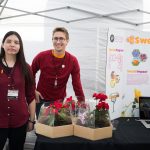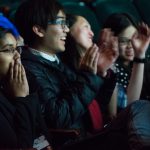- The Paseo Prototyping Festival and Challenge on April 8 at the Hammer Theatre Center in downtown San Jose featured civic innovation prototypes and presentations, art and technology exhibitions, speakers and panels, live performances and a youth maker space. Here Members of the B-Team created a prototype of bee boxes to be placed around downtown San Jose. (Photo: James Tensuan, ’15 Journalism)
- Assistant Professor Gary Craig Hobbs speaks to the audience at the Paseo Prototype Festival April 8. (Photo: James Tensuan, ’15 Journalism)
- SJSU students await the selection of the winning prototypes. (Photo: James Tensuan, ’15 Journalism)
By Barry Zepel
Last year, 16 teams of creative and imaginative students showcased their technological solutions for many of their city’s most pressing issues – including downtown safety, traffic congestion, homelessness, and support of local small business entrepreneurs – at the Paseo Public Prototyping Festival in downtown San Jose in April. In preparation for the festival, students majoring in art, design, engineering, business and the sciences spent months in collaboration with fellow team members to develop and refine their proposed solutions for improving quality of life in San Jose.
In September 2016, SJSU in collaboration with the John S. and James L. Knight Foundation, the City of San José, Intel, Microsoft and Autodesk – launched the Paseo Public Prototyping Challenge and Festival. The Challenge and Festival will be held every two years, pending funding.
“San José State University students are making a difference through their creative and technical talents,” said Gary Craig Hobbs, faculty director of the Paseo Prototyping Challenge and Festival. “The festival is the culmination of a year-long civic innovation challenge designed to incubate solutions to pressing social and environmental problems in San Jose.”
The 2016-17 student teams were selected by a competitive review process headed by university faculty members, as well as industry professionals, shared prototypes that included:
- A skateboard modified to generate electricity that can be used to charge a cell phone or power a headlight for the board to be safer at night;
- An app to better control city traffic and enhance access to public transportation;
- Devices to collect solar energy during the day in order to light up pedestrian walkways at night;
- A social app enabling residents to follow the actions of their local government, while communicating with it to access services and report problems;
- An inventory-tracking module to help local food entrepreneurs provide fresh fruits, vegetables and other healthy foods to city residents;
- An app to help drivers more efficiently locate available parking spaces near their downtown destinations, while eliminating excess traffic jams;
- A collaborative educational game that encourages learning and offersfirst-hand experience, while keeping students continuously engaged; and
- An app that helps individuals with niche interests and hobbies find other like-minded persons as well as events and organizations related to those pursuits.


